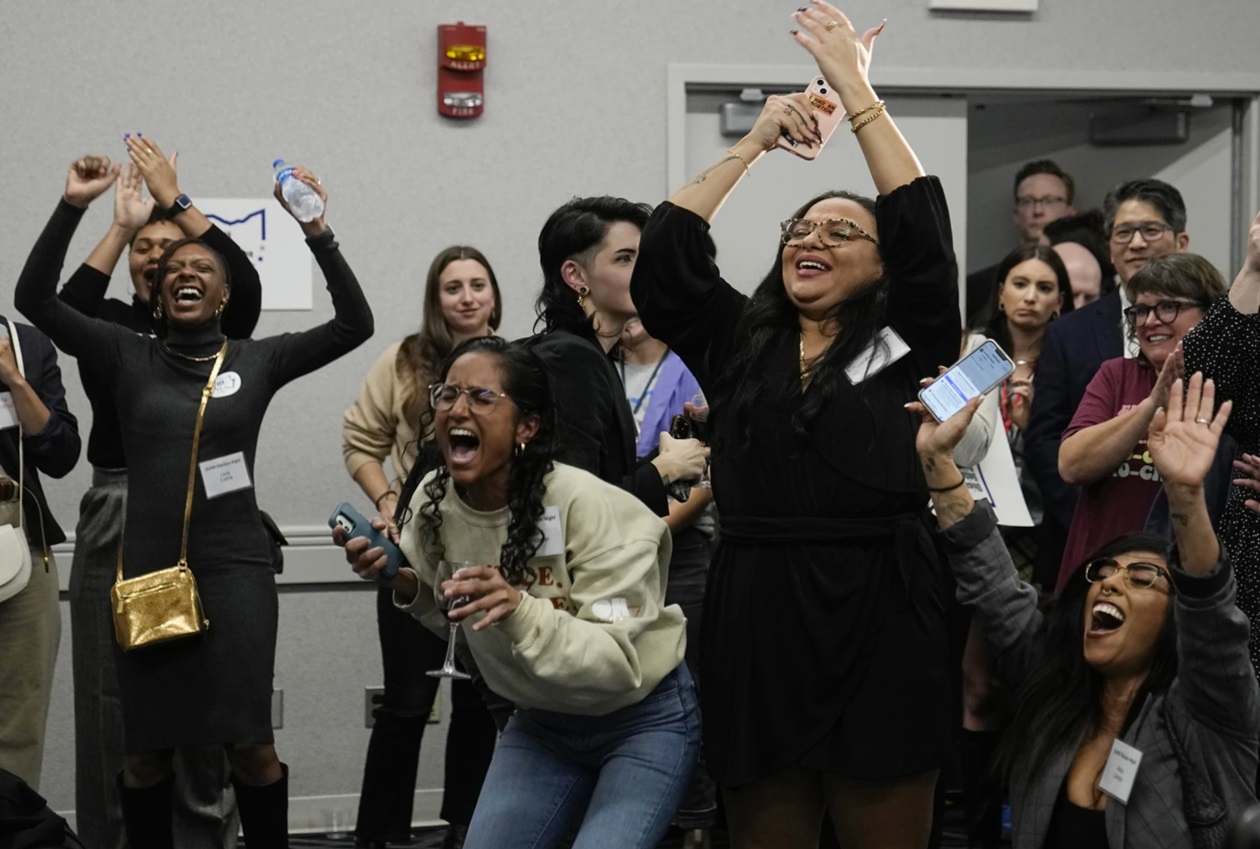
RICHMOND, VA.—In the reddest of states last night Trumpite politicians went down to defeat in a wave of victories notched by anti-MAGA forces. The sweeping victories came just two days after the New York Times/Siena poll showed President Biden running behind Trump in key swing states, calling into question the validity of the polls.
The victories last night were taken by many as an indication that the nation’s anti-MAGA forces continue to be strong and aren’t going anywhere, despite what the pollsters say. Democrats and the issues they support won convincingly in states where Trump had racked big victories in prior elections.
Many say that if Biden reversed his unpopular support for war in the Middle East, considering last night’s victories, he could be on his way to a big victory in 2024.
Riding the continuing wave of pro-abortion and pro-reproductive rights votes, progressives engineered impressive wins last night—-and gave a kick in the rear to another MAGA Republican, Virginia Gov. Glenn Youngkin–in the 2023 off-year elections.
With almost all the votes counted in key races in Ohio, Virginia, Kentucky, and Pennsylvania, pro-abortion candidates and Democrats swept the board, proving the issue is still potent in national politics and unlikely to fade next year, either. In his comments on the results, President Biden signaled he’s going to make sure it doesn’t.
In the process, Virginians turned Youngkin’s hopes of completely controlling Virginia state politics and imposing his social issues—“parental choice,” anti-abortion, textbook censorship among them—to ashes, by delivering both houses of the legislature to the Democrats.
Union leaders cheered the results, with Teachers (AFT) President Randi Weingarten, a New York City civics teacher, describing their national impact.
“These results underline what families have been telling us for the last two years: They don’t want culture wars. They want safe and welcoming public schools where their kids can recover and thrive. Where extremists peddled fear, voters wanted hope. Where extremists tried to smear and divide, voters demanded real solutions,” she said.
“Voters want the government to support them, not ban books, censor history, or limit their reproductive choices. They want good jobs, higher wages, lower costs, and investments in transport and infrastructure. They reject division and want to seize the future together.
“Voters saw the extremists for who they were,” Weingarten concluded. “The culture war agenda is toxic and hurtful, and voters agree the path to a brighter future for kids and families runs through the nation’s communities and public schools. That’s the message tonight.”
Virginia flip is not the sole win
The Virginia legislature’s flip to total Democratic—it had been split—was a sweeter win for progressives and yet was far from the only one.
They also scored triumphs in Ohio’s referendum to write abortion rights into the state Constitution, in re-electing moderate-to-progressive Democrat Andy Beshear as Kentucky governor, and in electing former state Rep. Sara Innamorato as Allegheny County (Pittsburgh) Executive.
Innamorato was a Democratic Socialist legislator who resigned from the party less than a year ago. She says still agrees with many of its goals. Innamorato edged corporate anti-Trump Republican Joe Rockey 51%-49%. Allegheny includes heavily Democratic Pittsburgh and much more politically marginal suburbs.
Innamorato “framed her campaign around those…‘left behind’ over the years,” Julian Routh reported in the Pittsburgh Union Progress, the strike paper the Pittsburgh News Guild runs while Pittsburgh Post-Gazette owners defy federal orders to bargain a new contract with their workers.
And in a vote for a vacant U.S. House seat, heavily Rhode Islanders elected Democrat Gabriel Amo by almost a 2-to-1 ratio.
The U.S. Justice Department sent election observers to Rhode Island’s 1st District, which Amo was running in and which includes the state capital of Providence, to ensure right-wing “observers” didn’t intimidate voters of color. Amo will be Rhode Island’s first-ever Black member of Congress.
Abortion rights drove voters to polls in Virginia
But the Virginia legislative sweep, with abortion rights as a big driver, was major news on election night.
“Virginians understood the assignment,” said Alexis McGill Johnson, president and CEO of the Planned Parenthood Action Fund, which spent more than a million dollars on phone banks, door-knocking, and ads in the Old Dominion. “By sending pro-reproductive rights majorities to the Commonwealth’s Senate and House, Virginians voted to keep in check an overzealous Gov. Youngkin, who’s said he’d happily sign any anti-abortion legislation that comes across his desk.
“Voters and advocates” sent “a resounding message that they want the power to make decisions about their own bodies, lives, and futures.”
The Virginia voters also helped workers, said AFSCME President Lee Saunders. And teachers and kids, added National Education Association President Becky Pringle. Both said their unions’ members knocked on thousands of doors, called voters, and, in NEA’s case, enlisted concerned parents, too.
“Voters demanded an end to the right-wing attacks on public schools, book bans, and censoring history,” Pringle declared. GOP heavy hitters also had a big interest in the race, seeing Youngkin as a potential alternative to Donald Trump, she explained.
“Over the last few months, right-wing billionaires have been pouring money into these [legislative] elections seeking to prop up” Youngkin. “Those billionaires are desperate for anyone but Trump to be the GOP nominee, which is why they spent millions of dollars to buoy their latest candidate de jour. But as Youngkin made this election a referendum on his political ambitions, voters spoke loudly in rejecting him and his radical agenda.
Instead, voters elected leaders who “will work with parents, grandparents, and educators to help every student thrive–no matter their race, place, or background,” Pringle, a Philadelphia science teacher, said.
“Virginians made a strong, clear statement this election: We won’t give up our voice on the job,” said Saunders. “AFSCME members mobilized their communities to elect candidates who will protect their hard-earned right to collectively bargain. Together, they flipped the Virginia House of Delegates and reelected labor champions to the Senate, knocking on thousands of doors in the process.
“With a pro-worker majority in both chambers, the economic future for so many Virginians is much brighter.”
Among the other Virginia winners: State Delegate Danica Roem (D), Virginia’s first-ever transgender state official, won an open State Senate seat, defeating Republican Bill Woolf 51.7%-48.3%. Roem concentrated on local issues, such as clogged highways, in rapidly changing Prince William County.
As in prior campaigns, former newspaper reporter Roem asked voters for their views, jotting the answers down in notebooks. Woolf tried to nationalize the race and make it about her gender and social issues.
“Six years later they doubled, tripled, and quadrupled down on transphobia in their closing message in this race,” Roem said in her victory speech. “And we won.”
In a key race that helped flip the Senate, Schuyler VanValkenburg, a teacher who opposes Youngkin’s ham-handed attempt to dictate book buying to local schools, ousted a right-wing Republican incumbent in the Richmond suburbs. Virginia progressives concentrated on both Roem and VanValkenberg and on re-electing a Democratic incumbent Assemblyman Rodney Willett from Henrico County, who won.
Ohioans write reproductive rights into the Constitution
In Ohio, voters followed up their rejection in August of a right-wing attempt to make referendums tougher to get on the ballot and tougher to pass by approving a constitutional amendment writing abortion rights, including medical contraception and pregnancy prevention, into the state Constitution.
The 56%-44% win cheered abortion rights advocates, but still left State House Speaker Jason Stephens, R-Kitts Hill, unconvinced. He threatened to find a legislative maneuver in Ohio’s GOP-gerrymandered legislature to enact a tough abortion ban, anyway.
As of 1 a.m. Eastern Time November 8, the raw vote totals were 2,142,956 (56.3%) for the amendment and 1,660,211 (43.7%) against it. The margin should grow. Totals included more than 95% of all precincts reporting in Ohio’s biggest counties—except Cuyahoga (Cleveland). There, the amendment led by a 3-to-1 ratio, with 86% of the vote counted. Pro-amendment ratios in the four biggest counties were two-to-one or better.
President Biden singled out the Ohio win in particular, previewing at least one campaign theme he will run for re-election on next year: Constitutional rights, including abortion rights.
“Americans once again voted to protect their fundamental freedoms–and democracy won,” said Biden. “In Ohio, voters protected access to reproductive health in their state constitution.
“Ohioans and voters across the country rejected attempts by MAGA Republican elected officials to impose extreme abortion bans that put the health and lives of women in jeopardy, force women to travel hundreds of miles for care, and threaten to criminalize doctors and nurses for providing the health care that their patients need and that they are trained to provide.
“This extreme and dangerous agenda is out of step with the vast majority of Americans. My administration will continue to protect access to reproductive health care and call on Congress to restore the protections of Roe v. Wade”—the Supreme Court decision legalizing abortion that right-wing justices obliterated in 2022—“in federal law once and for all.”
Beshear keeps Kentucky governorship
In Kentucky, incumbent Gov. Andy Beshear (D), the Bluegrass State’s sole bulwark against a complete MAGA Republican takeover, beat state Attorney General Daniel Cameron, the first Black to hold the office.
Four years ago, Beshear ousted controversial Republican incumbent Matt Bevins by a little more than 5,000 votes. He hit Bevins’s opposition to Medicaid expansion and his concentration on social issues.
This time Beshear beat Cameron by 693,370-626,196 (52.5%-47.5%) with more than 95% of the vote counted. Republicans won the other statewide offices. They also have supermajorities in the Kentucky legislature and, including both senators and hold all but one congressional seat.
Beshear ran on his economic record of lowering unemployment and bringing new jobs to Kentucky and on sharp criticism of Cameron’s absolute abortion ban. Cameron tried to run away from it, changing his position late in the campaign, to allow some exceptions. He also tried to tie Beshear to Democratic President Biden, who lost Kentucky badly in 2020 to Donald Trump. Neither message worked.
Cameron also ducked discussing the fatal shooting of Breonna Taylor, the sleeping and innocent Black woman, in her bed, by Louisville cops in a drug raid gone wrong. Cameron shied away from prosecution. Taylor’s family campaigned against him.
“Listen up Republicans: A strict anti-abortion law without some exceptions is not the preferred position of most voters,” one tweeter, Clair, commented after seeing the results. Last year, Kentucky voters also rejected a state constitutional amendment to ban abortion. Another tweeter, identified as George, added: “Great. Including Ohio, I hope Republicans just keep running on anti-abortion.”
The only race progressives and workers didn’t win was one where abortion had nothing to do with the outcome. It was a local referendum, Proposition 22, on the ballot in Cincinnati. There, Norfolk Southern Railroad—the same freight railroad that brought disaster and a mushroom cloud to East Palestine, Ohio—spent $4.2 million on its campaign to get the voters’ OK to buy the Cincinnati Southern, the last city-owned freight line in the U.S. It runs from Cincinnati to Chattanooga, Tenn.
The big freight line also recruited the mayor’s support, and the endorsement of the Cincinnati Enquirer, for its bid. Its money would give Cincinnati a “trust fund” for infrastructure improvements.
Railroad Workers United, the grass-roots group uniting members of the 14 different rail crafts, and the NAACP—both concerned about the big freight line’s safety record—campaigned against Norfolk Southern. But they lost 42,255 (51.8%)-39,252 (48.2%).
We hope you appreciated this article. At People’s World, we believe news and information should be free and accessible to all, but we need your help. Our journalism is free of corporate influence and paywalls because we are totally reader-supported. Only you, our readers and supporters, make this possible. If you enjoy reading People’s World and the stories we bring you, please support our work by donating or becoming a monthly sustainer today. Thank you!












Comments